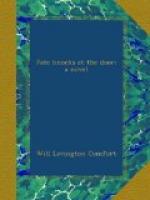It was hard, until Beth Truba leaned forward and ignited the story. After that, the furious experience lived in Bedient’s mind, and most of it was related into her eyes. When he described the light before the break of the storm, how it was like the hall-way of his boyhood, where the yellow-green glass had frightened him, Beth became paler if possible, and more than ever intent. Back in her mind, a sentence of Cairns’ was repeating, “His voice seemed to come from behind the intention of Fate."... Finally when Bedient told of reaching Equatoria, and of the morning when Captain Carreras nudged bashfully—wanting his arm a last time—Beth Truba exclaimed softly:
“Oh, no, that really can’t all be true, it’s too good!” and her listening eyes stirred with ecstasy....
She liked, too, his picture of the hacienda on the hill.... The party talked away up into the top of the night and over; and always when Bedient started across (in his heart) to tame the wine-dark eyes—lo, they were gone from him.
TENTH CHAPTER
THE JEWS AND THE ROMANS
Kate Wilkes lived at the Smilax Club, as did Vina Nettleton, and, for the present, Mrs. Wordling. The actress was recently in from the road. Her play had not run its course, merely abated for the hot months. She was an important satellite, if not a stellar attraction. About noon, on the day following the party for Bedient, Mrs. Wordling appeared in the breakfast room, and sat down at the table with Kate Wilkes, who was having her coffee.
“What an extraordinary evening we had,” the actress remarked. “David’s party was surely a success.”
“Rather,” assented Miss Wilkes, who felt old and nettled. She seemed of endless length, and one would suppose that her clothes were designed so that not one bone should be missed. Mrs. Wordling was not an especial favorite with her.
“They made it up beautifully between them, didn’t they?” the actress observed, as she squeezed orange-juice into her spoon.
“What?”
“That story.”
“Who?”
“Why, that story—that friendship, storm-at-sea, Equatoria story—done jointly by Messrs. Cairns and Bedient.”
“You think they rehearsed it, then?” Kate Wilkes asked softly.
“Why, of course. It unfolded like a story—each piling on clever enthusiasm for the other.”
There was a slight pause.
“And so you think David Cairns simulated that fine touch, about discovering through his friend, what damage New York was doing him?” Kate Wilkes’ manner was lightly reflective.
“Of course. Don’t you remember how he stumbled until you helped him going?”
“You think—as I understand it——” Miss Wilkes had become queerly penetrative, and spoke in a way that made one think of a beetle being pinned through the thorax, “——that David Cairns merely used his artistic intelligence for our entertainment; that Andrew Bedient is merely an interesting type of sailor and wanderer who has struck it rich?”




